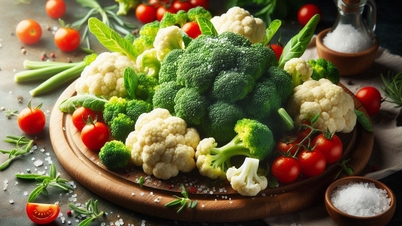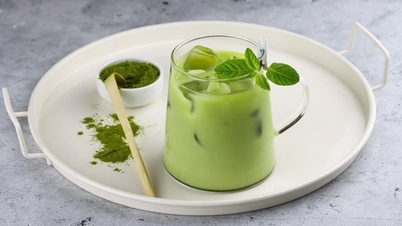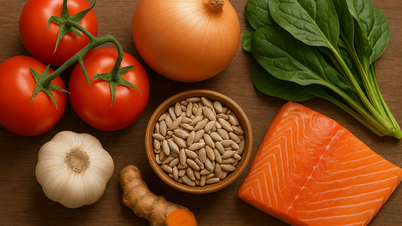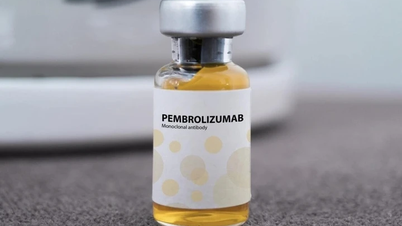According to Traditional Medicine Practitioner Bui Dac Sang, Vietnam Academy of Science and Technology, Hanoi Oriental Medicine Association, cabbage has a sweet, bland taste and cold properties. The part used as medicine is the whole cabbage plant rolled above ground.
In Oriental medicine, cabbage has diuretic, laxative, blood purifying, detoxifying, wound healing effects, and provides a certain amount of sulfur (S) to the body. This is a medicinal herb used to treat stomach pain, cough, sore throat, hoarseness, insect bites, arthritis, gout, sciatica, worms, pimples, etc.
1. Health benefits of consuming cabbage regularly
According to modern medicine, regular use of cabbage will have the following effects:
1.1 Nutritional supplements
Cabbage is rich in important vitamins and antioxidants that support overall health, including:
Vitamin C : Supports the immune system, collagen production, wound healing, and iron absorption; helps protect against oxidative stress associated with chronic diseases.
Vitamin K: Important for blood clotting, bone health and maintaining artery flexibility. One cup of cabbage provides more than half of the body's daily needs. However, those taking blood thinning medications should adjust their cabbage intake accordingly. Those with thyroid disease should consult a doctor or nutritionist about eating cabbage.
- Polyphenols and flavonoids: These antioxidants help neutralize free radicals, promote cellular health and healthy aging; reduce inflammation (reducing the risk of chronic diseases like arthritis, diabetes, dementia, and others).

Cabbage is both a medicine and provides many nutrients for the body.
1.2 Improve weight management
With nearly 10% of your daily fiber intake per 100g, cabbage supports weight loss by eating a moderate amount while still controlling your calorie intake. Furthermore, fiber helps keep you fuller for longer and supports healthy digestion.
1.3 May help lower cholesterol levels
The plant sterols in cabbage compete with cholesterol for absorption in the gut, which may help lower LDL (“bad”) cholesterol levels and support heart health. Additionally, red cabbage is rich in anthocyanins, a pigment that may help reduce the risk of heart disease. Cabbage also provides vitamin B6 and folate, which help regulate homocysteine levels and support the production of healthy red blood cells.
1.4 Improve gut health
Cabbage fiber feeds beneficial bacteria in the gut, promoting digestive balance. Both insoluble and soluble fiber contribute to the regularity and diversity of the gut microbiome.
Special plant compounds (phytosterols) help maintain a healthy gut barrier and help reduce the risk of colon cancer.
1.5 Supports high blood pressure control
Cabbage provides potassium, an important mineral that helps balance sodium levels and regulate blood pressure. Diets high in potassium (like the DASH diet) have been shown to be linked to a reduced risk of high blood pressure and stroke.
1.6 Reduce inflammation and prevent type 2 diabetes
Compounds like sulforaphane and kaempferol in cabbage have anti-inflammatory effects, which may reduce the risk of chronic diseases like heart disease and arthritis.
Additionally, cabbage's fiber, plant sterols, and glucosinolates may improve insulin sensitivity, support healthy blood sugar control, and reduce the risk of type 2 diabetes.
2. How to add cabbage
Some ways to add cabbage to your diet include:
- Eat raw: Chop into vitamin-rich salads.
- Cooked: Add to soups, stir-fries, or stews. Steaming retains the most nutrients.
- Pickling: Pickling cabbage can provide probiotics that are beneficial for gut health.
- Juicing: Cabbage can be juiced or pounded to drink.
Note: People who often have cold hands and feet, often have problems related to colds, people with kidney disease requiring dialysis, people with poor digestive systems, people with hyperthyroidism, people with allergies, subconjunctival hemorrhage, etc. should be careful when eating cabbage, because in different forms of preparation, cabbage has the ability to aggravate the disease.
Source: https://suckhoedoisong.vn/dieu-gi-xay-ra-voi-co-the-khi-an-bap-cai-thuong-xuyen-169251107154541353.htm






![[Photo] Highways passing through Dong Nai](https://vphoto.vietnam.vn/thumb/1200x675/vietnam/resource/IMAGE/2025/11/12/1762940149627_ndo_br_1-resize-5756-jpg.webp)





























































































![Dong Nai OCOP transition: [Article 3] Linking tourism with OCOP product consumption](https://vphoto.vietnam.vn/thumb/402x226/vietnam/resource/IMAGE/2025/11/10/1762739199309_1324-2740-7_n-162543_981.jpeg)








Comment (0)